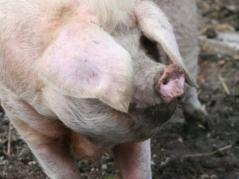 URBANA, Ill. – Distillers dried grains with solubles (DDGS) are a co-product of the ethanol industry and have been an affordable source of energy and protein in swine diets for decades. In recent years, ethanol plants have begun to centrifuge the solubles from ethanol production to extract oil, which is sold to the biodiesel industry. As a result, new low-fat DDGS products are available for swine diets. Researchers at the University of Illinois are evaluating these products for use in swine diets.
URBANA, Ill. – Distillers dried grains with solubles (DDGS) are a co-product of the ethanol industry and have been an affordable source of energy and protein in swine diets for decades. In recent years, ethanol plants have begun to centrifuge the solubles from ethanol production to extract oil, which is sold to the biodiesel industry. As a result, new low-fat DDGS products are available for swine diets. Researchers at the University of Illinois are evaluating these products for use in swine diets.
“Dietary fat concentration has been shown to be a factor in the digestibility of nutrients,” said Hans Stein, a professor of animal sciences at U of I. “Because DDGS supplies a significant amount of protein in swine diets, we wanted to investigate if amino acid digestibility is compromised in diets containing low-fat DDGS.”
Stein’s team compared amino acid digestibility in growing pigs fed diets containing conventional DDGS or one of two sources of low-fat DDGS. The conventional DDGS contained 11.5 percent fat, whereas the two low-fat DDGS sources contained 7.5 percent and 6.9 percent fat, respectively.
“We observed that the standardized ileal digestibility of almost all amino acids was greater in conventional DDGS than in either source of low-fat DDGS,” Stein said.
The team also investigated if adding fat to the low-fat DDGS diets improves amino acid digestibility. Corn oil was added to the low-fat DDGS diets with the intent to bring the concentration of fat in these diets to the same level as in the diet containing conventional DDGS.
“Adding dietary fat to diets containing low-fat DDGS didn’t improve the digestibility of amino acids,” Stein explained. “That result was somewhat surprising because it conflicted with previous data.” However, he noted that in previous experiments, the differences in fat levels between diets without or with added fat were much greater than in the current study.
Stein added that based on these observations, feed companies and swine producers using low-fat DDGS may have to formulate diets based on reduced values for the standardized ileal digestibility of amino acids compared with values for conventional DDGS.
The study, “Amino acid digestibility in low-fat distillers dried grains with solubles fed to growing pigs,” was published in a recent edition of the Journal of Animal Science and Biotechnology. Co-authors are Shelby Curry and Diego Navarro, both master’s students in the Stein Monogastric Nutrition Lab, as well as former lab members Ferdinando Almeida and Juliana Soares Almeida. The full text of the article is available online at http://www.jasbsci.com/content/5/1/27.
Financial support for the study was provided by Poet Nutrition of Sioux Falls, South Dakota.
Author
Stephanie Henry
Source
ACES News, press release, 2014-07-29.
Supplier
Journal of Animal Science and Biotechnology
POET, LLC.
University of Illinois
Share
Renewable Carbon News – Daily Newsletter
Subscribe to our daily email newsletter – the world's leading newsletter on renewable materials and chemicals












